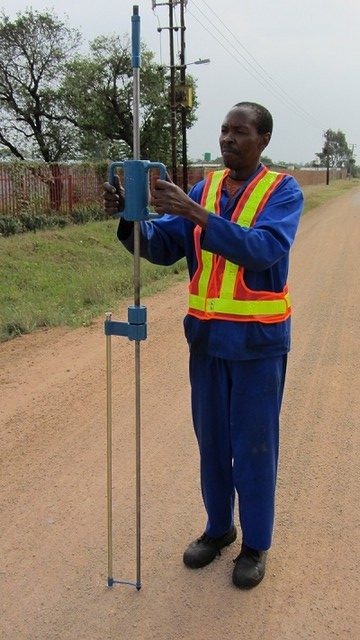
A Dynamic Cone Penetrometer (DCP) is a handheld device used to measure the in-situ strength and thickness of soil layers by repeatedly striking a cone into the ground. It’s primarily used in geotechnical engineering for pavement evaluation, site investigations, and construction quality control.
Here’s a more detailed overview:
1. Purpose and Applications:
-
Pavement Evaluation:Assessing the strength of pavement layers (e.g., asphalt or granular materials) to determine their durability and potential for repair.
-
Site Investigations:Gauging soil strength and depth profiles, which is crucial for foundation design and assessing the suitability of a site for construction.
-
Construction Quality Control:Verifying the compaction of soil or granular materials used for earthworks, trenches, and backfilling.
-
Other Uses:Monitoring soil strength in areas like cell tower construction, fiber optic cable installations, and pipeline construction.
2. How it Works:
- The DCP uses a standard hammer and a 60-degree cone to drive a rod into the ground.
- The penetration resistance, measured as the distance the cone advances with each blow, is recorded.
- This data is used to create a penetration index, which can be correlated to other soil strength parameters like the California Bearing Ratio (CBR).
3. Benefits:
-
Speed and Efficiency:DCP tests are quick and easy to perform, providing real-time data.
-
Cost-Effective:Compared to traditional drilling methods, DCP is more affordable, especially for preliminary investigations and remote areas.
-
In-Situ Testing:DCP assesses soil in its natural state, minimizing disturbance and providing a more accurate representation of soil properties.
-
Depth Profiling:DCP can reveal the strength of different soil layers at various depths, offering valuable insights for design and construction.
4. Limitations:
-
Hard Materials:DCP may not be suitable for very hard or rocky soils where the cone may not penetrate.
-
Interpretation:DCP results need to be interpreted carefully and may require correlations with other testing methods for a more comprehensive understanding of soil behavior.
Our DCP models have an 8 kg (17.6 lb) hammer to better evaluate weak soils.The DCP is primarily used to determine in place soil shear strength in road construction. It has a CBR range from less than 0.5 to 100% and bearing value range from 430 to 10,800 psf. The User’s Manual provides tables with relationships between penetration per blow, CBR value.
Accessories
- 1m Extension rod
- DCP top rod complete with weight
- 1m Bottom rod
- 1m Ruler
- 1,5m Ruler
- 2m Ruler
- Carry bag for DCP
- DCP Cone (Hardened)
- DCP Cone (Disposable)
- DCP Cone adaptor – for disposable cones
- DCP Weight (8Kg)

Click Below for Operating Manual:

